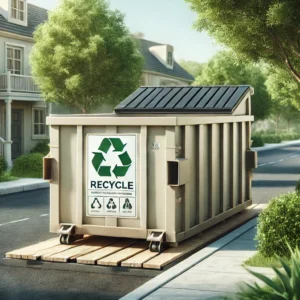
Recycling plays a crucial role in minimizing waste and promoting environmental sustainability. Many individuals often seek convenient and responsible places to drop off their recyclables. Local recycling centers, community drop-off locations, and participating supermarkets provide accessible options for recycling various materials.
In addition to designated recycling centers, some municipalities offer curbside pickup for recyclables, making it easier for residents to contribute. Many regions also host special events or programs aimed at encouraging residents to recycle electronic waste and other hard-to-recycle items. Finding the right Places to Drop Off Recycling point can facilitate responsible recycling and empower communities to reduce their ecological footprint.
As awareness of recycling practices grows, so does the availability of options for effective disposal. Residents should consider exploring local resources that promote recycling, often found on municipal websites or community boards. By utilizing these available services, individuals can play a meaningful role in fostering a cleaner, greener environment.
Understanding Recycling Drop-Off Points
Recycling drop-off points play a crucial role in waste management and sustainability. These sites facilitate the proper disposal of various recyclable materials, ensuring they are processed correctly. The following sections detail the types of centers available, the items typically accepted, and how to prepare materials for recycling.
Types of Recycling Centers
There are several types of recycling centers, each serving distinct purposes.
- Curbside Collection Programs: Many municipalities offer curbside pickup services where residents place recyclables in designated bins.
- Drop-Off Centers: These locations allow individuals to bring recyclables directly, often providing a wide range of collection options.
- Retail Take-Back Programs: Stores may have programs where customers can return specific items like batteries or electronics for recycling.
- Designated Recycling Facilities: Large facilities process various materials in bulk. They typically serve commercial businesses and municipalities.
Each type of center has specific hours of operation and guidelines that users need to follow.
Items Accepted at Recycling Drop-Offs
Recycling drop-offs accept a variety of materials, but acceptance can vary by location. Common items include:
- Plastics: Look for labeled plastics (#1-#7), such as bottles and containers.
- Metals: Aluminum cans, steel cans, and scrap metal are widely accepted.
- Paper: Most centers take clean paper and cardboard, including newspaper and boxes.
- Glass: Clear, green, and brown glass bottles are typically accepted.
It is important to check with local centers, as some may have restrictions or specific requirements for certain materials.
Preparing Items for Recycling
Preparing recyclables correctly increases the efficiency of recycling programs. Follow these tips:
- Clean Containers: Rinse out food containers to avoid contamination. Residual food can render entire batches unrecyclable.
- Remove Labels: While not always required, removing labels can help streamline processing.
- Separate Materials: Keep different materials separate to avoid contamination issues, especially plastics from other recyclables.
- Flatten Boxes: For cardboard, flatten boxes to maximize space and facilitate easier handling at drop-off points.
Properly preparing items before dropping them off can significantly improve recycling outcomes and efficiency.
Finding Local Recycling Drop-Off Locations
Identifying nearby recycling drop-off points is essential for effective waste management. Accessible options include municipal programs, participating retailers, and specialized facilities that cater to various materials.
Municipal Recycling Programs
Many cities and counties offer municipal recycling programs to encourage residents to dispose of recyclable materials responsibly. Local governments typically provide designated drop-off centers for items such as paper, plastics, metals, and glass.
Information about these locations can often be found on the municipality’s official website. Residents should check for specific acceptance guidelines, as not all centers accept the same materials.
Additionally, some municipalities organize community clean-up events where residents can bring recyclables for free processing. These events promote community involvement and awareness of recycling’s importance.
Retailers and Recycling
Some retailers have adopted recycling initiatives, allowing customers to drop off certain items at their locations. Stores such as grocery chains, electronics outlets, and home improvement stores may accept materials like plastic bags, batteries, and electronic waste.
Customers can visit these stores to find collection bins specifically designated for recycling. Retailers often provide information on which items can be recycled and any limitations regarding the types of products.
It’s advisable for individuals to check the retailer’s website or contact customer service for details on their recycling programs. This can help ensure that they are prepared when visiting the store.
Specialized Recycling Facilities
Specialized recycling facilities focus on processing specific types of materials that may not be accepted at municipal drop-off points. These facilities often cater to items such as hazardous waste, old appliances, and construction debris.
Locating these specialized centers may require more effort, as they can be less common than general drop-off locations. Online resources like local waste management authority websites can provide detailed information on where to find these facilities.
Facilities may also have guidelines on how to prepare items before drop-off. Understanding these requirements can streamline the recycling process and ensure that materials are handled properly.
Copper Companies Stock: Analyzing Investment Opportunities in 2025
Investors are increasingly interested in copper companies as demand for the metal rises, d…